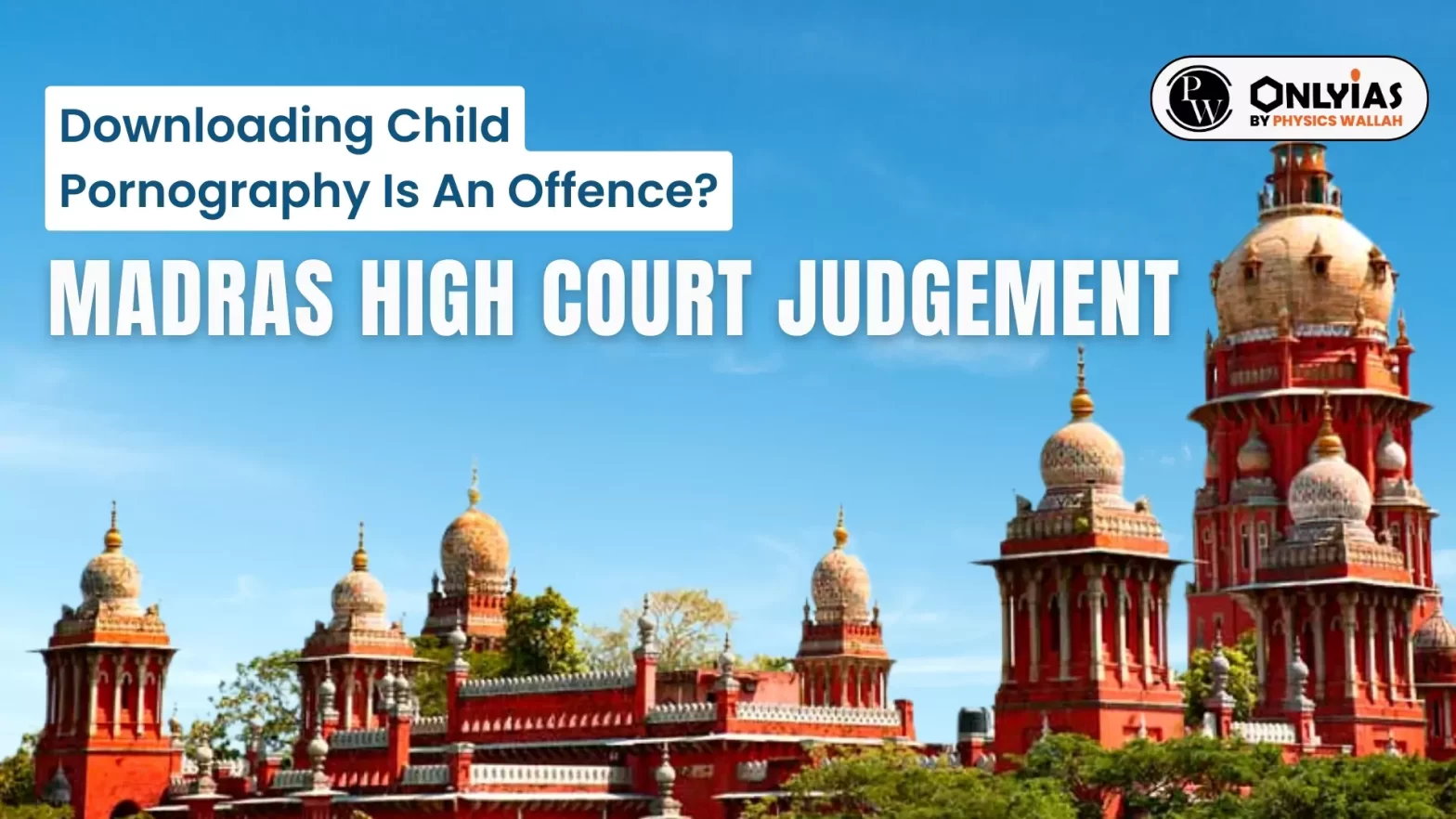Context:
This editorial is based on the news “Downloading child pornography is an offence” which was published in the Hindu. Recently, the Madras High Court, in S. Harish vs Inspector of Police, quashed the judicial proceedings and held that downloading child pornography was not an offence under Section 67B of the Information Technology (IT) Act, 2000.
Madras High Court Judgement On Downloading Child Pornography
- Narrow Interpretation: The two files pertaining to child pornography were downloaded and available on the mobile phone of the accused. These facts are sufficient to attract the application of Section 67B(b) of the IT Act.
- But the High Court held that in order to constitute an offence, the accused must have published, transmitted, created material depicting children in sexually explicit acts or conduct.
- Misuse of Power: The Madras High Court used its inherent powers under Section 482 of the Criminal Procedure Code (CrPC) to prevent misuse of the process of court and quashed the judicial proceedings.
- No Offence: The High Court had held that watching pornography in private space was not an offence under Section 292 of the Indian Penal Code (IPC).
- Did Not Consider Section 67(B): The High Court did not reproduce Section 67B in its judgement.
Provisions that Should Be Considered By Madras High Court
- Guidelines of the Supreme Court: The Supreme Court has laid down certain guidelines in State of Haryana vs Bhajan Lal (1992) to exercise powers under Section 482 of the CrPC (or extraordinary powers under Article 226).
- Such powers could be used where the allegations made in the first information report or the complaint, even if taken at face value and accepted in their entirety do not, prima facie, constitute an offence or make out a case against the accused.
- Therefore, the Madras High Court could not in its wisdom quash the judicial proceeding.
- Section 67B(b) of the IT Act: It states that ‘whoever,- creates text or digital images, collects, seeks, browses, downloads, advertises, promotes, exchanges or distributes material in any electronic form depicting children in obscene or indecent or sexually explicit manner’ shall be punished on first conviction with imprisonment of either description for a term which may extend to five years and with fine which may extend to ten lakh rupees.
- Sub-clauses of Section 67B(b) of the IT Act:
- Sub-clause (a): It talks about publishing or transmitting material depicting children engaged in sexually explicit acts or conduct.
- Sub-clause (b): It deals with acts including downloading of child pornography material.
- Sub-clause (c): It talks about cultivating, enticing or inducing children to an online sexually explicit relationship.
- Sub-clause (d): It talks about facilitating abuse of children online.
- Sub-clause (e): It talks about recording abuse/a sexually explicit act with children.
Way Forward
- Clear & Wide Explanation: The Section 67 read with Sections 67A and 67B of the IT Act are a complete code and the given acts are exclusively punishable under this code, that even seeking or downloading child pornography made a specific offence.
- Consider POCSO Act in all Interpretations: The purpose of enacting special Acts such as the POCSO Act and making special provisions in the IT Act is to protect children from sexual exploitation and punish people involved in different forms of exploitation.
- Replacement of Child Pornography with the term CSAM: The National Crime Records Bureau, Ministry of Home Affairs, under an agreement with the American National Center for Missing & Exploited Children, regularly gets geo-tagged CyberTipline reports to prosecute those who upload the child sexual abuse materials (CSAM) from anywhere in India.
- The use of the term CSAM is preferred because the term pornography implies consent which a child is not capable of giving.
- Amendment to POCSO Act: It may also be done and mere possession of CSAM be made a separate offence to remove inconsistency between the provisions of the POCSO Act and the IT Act.
- Appeal by State Government for Justice: The State government must appeal against this judgement of the Madras High Court. Otherwise, it will set a bad precedent for the State.
Also Read: Interim Budget 2024-2025
![]() 8 Feb 2024
8 Feb 2024

